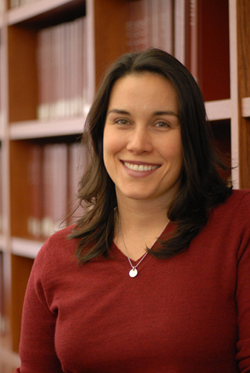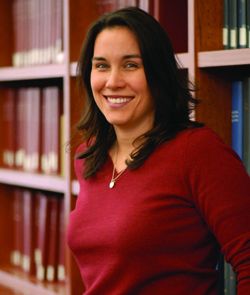Redefining 'Normal' in Personality Testing
Jill Hill argues that the ubiquitous MMPI-2 test misses the mark when it comes to American Indians
The Minnesota Multiphasic Personality Inventory-2 packs a lot of words in its name, but that’s the least of its powers.
The MMPI-2 is one of the most well-known and widely used personality assessment tests in the world. It has been translated into more than 22 languages and is a highly respected diagnostic tool in assessing mental disorders in adults. Employers use it in their hiring decisions, prisons to review parole eligibility and court systems to evaluate child custody cases. In other words, the way you answer its 567 true-or-false questions can have serious, life-long implications.
But according to Jill Hill, the newly appointed Assistant Professor in the Department of Counseling and Clinical Psychology, the test is too often misapplied. She questions its use outside of the American/Western middle-class culture that developed it in the first place. Hill has dedicated her academic life to researching the test’s effectiveness in measuring mental disorders and symptoms in the American Indian population and found it vastly deficient, in ways that raise questions about its appropriateness for other cultures as well.
At TC, Hill—herself part American Indian— intends to keep up her research on the MMPI-2 and personality assessment, but also eventually expand her cultural analysis to include cognitive assessments such as the Stanford-Binet Intelligence Scale and the Wechsler Adult Intelligence Scale. She is also teaching a course, Assessment in Counseling Psychology.
Hill began her research as a graduate student at the University of Oklahoma
“People would say ‘Do you want me to answer this the white way or the Indian way?’” Hill remembers. “They know exactly what the questions are getting at, and they are so aware that their beliefs and approaches to life will be pathologized.”
Hill isn’t the first critic of the MMPI-2. The original test was developed in the 1940s and was eventually revised in 1989 following complaints that its development did not include testing it on any people of color. In order to redesign the test, researchers subsequently attempted to cobble together a group representative of the United States Washington United States
“The bottom line is that this particular test does not take into account indigenous perspectives when it comes to measuring, even defining, what psychopathology is,” Hill says. “And yet it’s used extensively and without a critical approach.
“It is incredibly appropriate for certain folks but not for everyone,” she continues. “I don’t like how it has been misused.”
As Hill sorts through the data and amasses information about the cultural practices of the two Oklahoma tribes—at one point she sat down with 13 tribal elders from all different walks of life and went through some of the questions with them—she stays focused on her ultimate goal, which is not simply a reworking of the MMPI-2 but a transformation of the current practice of assessing and treating the mental health of American Indians and other cultures. She is calling for “psychological self-determination,” or, in other words, the right of indigenous people to determine what is and isn’t healthy within their own cultural context.
“I don’t want to simply adapt Western approaches to indigenous people, but to be a stronger voice for indigenous people to have self-determination,” Hill explains. “I’m actually just applying that to psychology.”
Hill, who is from the Delaware tribe, grew up mainly in Iowa , but made frequent trips to Oklahoma
“For me, when my interest in psychology was blossoming, I was looking at it in terms of ‘How can I apply this to people I know and love?’,” she says. “And there wasn’t anything.”
Published Tuesday, Mar. 24, 2009

